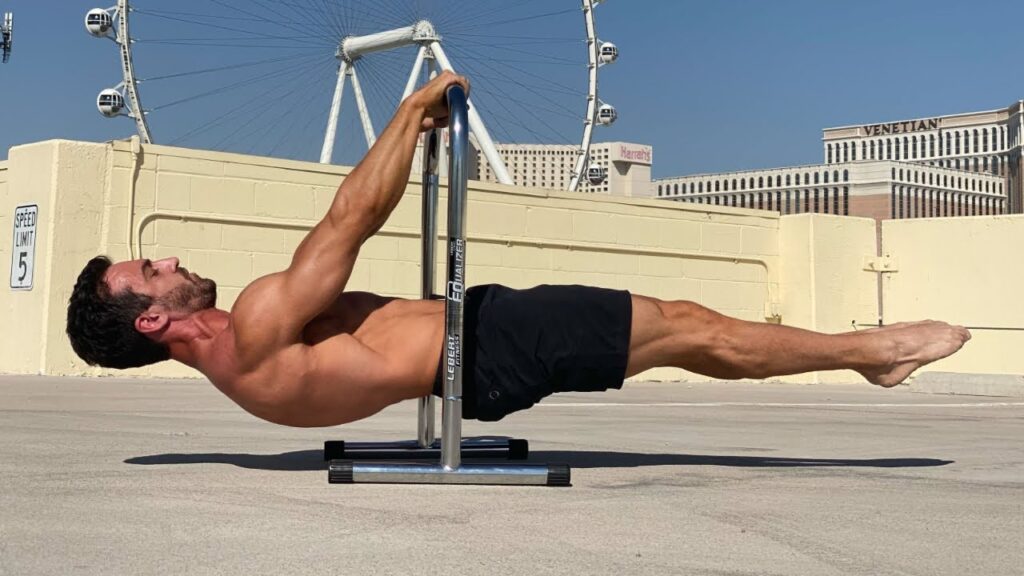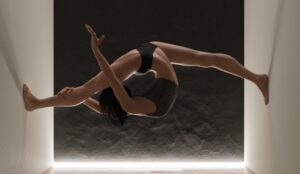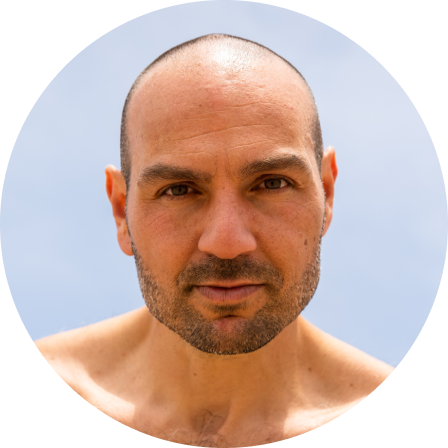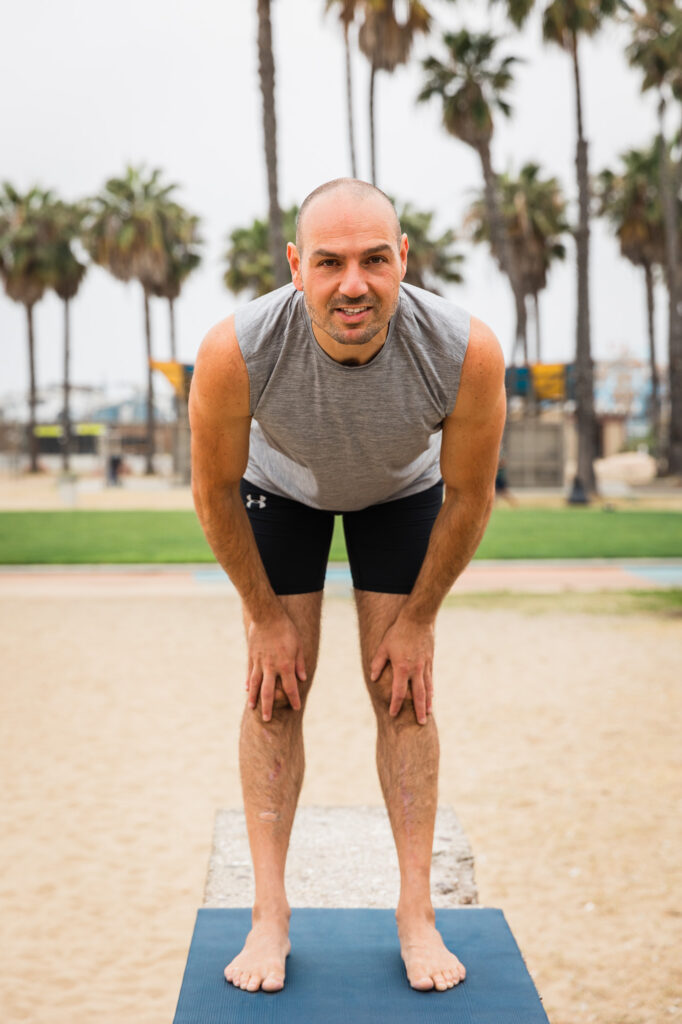Don’t be fooled: Why the best performers aren’t automatically the best teachers


Recently I went to the Original Muscle Beach to workout and in the distance I saw 2 guys repeatedly holding a full front lever (FL; pictured above) doing it for the ‘gram.
Seeing a full FL hold in the general population is extremely rare (probably a <0.1% level of rare). Even amongst the extremely able-bodied muscle-beach-population I would surmise that less than 3% can hold a full front lever, just to give perspective as to how uncommon it truly is. The reason for this is because it requires an obscene amount of strength to pull it off. There is no “trick” that will help you. It requires an excellent strength to weight ratio.
I went up to them to commend them on their excellent display of strength to which they were very thankful. Now being up close to them, I quickly noted how lean they were and, not surprisingly, on the shorter side (less than 5’6″ or <170cm). One of them had such low body fat actually that I could’ve used them to give lessons in muscular anatomy.
I told them where I was at with my personal front lever progress (full front lever negatives) and I asked them what worked for them. They both basically said “just do everything and you’ll get there” and that it took them only “about a year or 2” to get there. It was then I realized again, that they didn’t struggle with achieving the front lever whatsoever in the same way I did.
If you’re short and lean, the human experience and journey of calisthenics is going to be very different than your taller, heavier brethren.
Being short and lean makes for a huge advantage with bodyweight exercises. So much so that you can go through progressions with such little fuss that you might actually skip the very progression exercises others may be stuck on for months. You can achieve goals with suboptimal programming or no legit programming at all. You don’t have to be as methodical or precise in your training. You literally just need to put the work in and you will experience consistently linear progress with shorter plateau’s or regressions.
On the flipside, somebody very tall and heavy, no matter how methodical they are with their program adherence, will experience long, drawn out plateaus. They will need to figure out the intermediary progressions to help them bridge the gap, use solid programming and have extra mental fortitude to persevere through the extra months and years of arduous, slow progress.
5’9″ (175cm) seems to be the tipping point
From observing and training with hundreds of people of different sizes and shapes I’ve come to realize that 5’9″ seems to be the line in the sand. If you’re taller than 5’9″ (175cm), everything becomes significantly more difficult. Go much taller and the progress becomes exponentially slower. Shorter than that height and progress is more compressed, steady and linear. If you’re much shorter, progress will be exponentially faster! To put it in perspective, someone who is 5’3″ & 120lbs might take 6 months to achieve a front lever while someone 6’3 & 190lbs might take 3 years.
Just a few pounds makes a noticeable difference…
In a year I typically fluctuate between 175 and 182lbs (summer and winter). And when I’m 182lbs, my front lever performance takes a massive hit. When I start losing some weight and I am at 178lbs or lower, everything becomes so much easier it’s actually ridiculous considering it’s only a difference of 4lbs. (Any lower weight than that and I start to feel like I am a different body entirely.) So I can imagine if 4-8lbsmakes that much of a difference, how much being 20-40lbs lighter would with shorter limbs for greater leverage!
To put it into greater perspective…
My friend, who is particularly quite short (5’3″) and also very lean (6 pack and all) was doing pullups and I asked if he ever worked on the front lever. He said no, never and that he just does pullups and dips and that’s it. I was training for the front lever alongside with him and he tried it out and was actually able to hold a full front lever for almost a second with literally zero training for it. Meanwhile, it took me a solid year and 150+ workouts to get to that same level to put things in perspective. So if he trained for it seriously, he wouldn’t need to dig as deep and figure out what it takes to achieve some of these moves. He can most likely get there by literally just doing random exercises and reach his goals.
The lighter/shorter folks will often master bodyweight exercises faster. However, it doesn’t automatically mean that they will be the best coaches or teachers, despite their incredible performance abilities.
I can’t tell you the number of times I’ve been disappointed by the teaching skills of a high level athlete or gymnast. It seems like they can’t relate to the struggles that taller/heavier folks have to go through. They may not realize that what worked for them, doesn’t work for others. They also might not realize how much more refined and granular the progressions must be for success.
Note: At this point I should say that these are my sincere observations and not meant to be an attack nor meant to discount any one particular persons abilities. And I am not saying that if you are short, you didn’t put the work in nor that you’re not a good teacher. I am talking about the finer nuances within this topic. And if you disagree with me, definitely leave a comment below! I encourage discourse!
Ironically the taller/heavier folks who have mastered these difficult moves are often able to teach intricacies of how they got there because the journey was so much longer and drawn out that it’s very difficult to forget the struggles one had to go through to achieve the breakthroughs.
Personally, I had to implement a very strict regimen. I couldn’t just put the work in willy-nilly without very well thought out programming and expected to level up. And I couldn’t do that with the handicap of excess body fat either, so body-fat reduction was even more imperative to increase the power to weight ratio.
I’m not discounting anyones abilities at all. Everyone had to put the work into it too, for sure. But just be aware that the people who achieved these strength-moves easily, are not automatically the best at teaching it to others. You would think they are, because they can perform very well and some of them are indeed very good teachers, but most of them are not, unfortunately. Ironically, the worst ones seem to be the gymnasts who learned everything at a very young age. The people who could relate the LEAST to adults are gymnasts who learned everything when they were young!
This concept applies to flexibility and weight loss as well!
Flexibility: Somebody born with hypermobility can have the splits or show off flexibility that fall into the realm of contortion. Does that mean they can teach someone who can’t touch their toes with legs straight, how to get there? Not necessarily. Especially if they were never in their shoes to begin with. Alternatively, the people who couldn’t touch their toes and now can do the splits may be the best person to ask for advice. Alternatively, the person who was inflexible to begin with and later gained flexibility will better be able to help those because they were once in the same position and know what it takes to get there.

Weight Loss: Similarly, a person that struggled with obesity and is now very lean is probably more qualified to teach people how to lose weight than the person who was underweight their whole life and never struggled with any binge-eating disorders to begin with.
This is a blessing in disguise
I want to make it clear that I am not looking for pity, nor wishing I was short or anything like that. I exceedingly enjoy the training that I do and love my body. I just find the paradoxical nature of this topic very interesting. I actually see my tallness as a blessing in disguise because my struggles make me a better teacher. I know that when I achieve a difficult move, I am very well acquainted and qualified to know what it takes to get there. And that, my friends, is how you must always see the silver lining to things, otherwise life will be really dreary.
So now I’d love to hear your thoughts on the matter! Did I strike a chord with you? Do you agree/disagree? Let me know! And if this topic was interesting to you, let me know and I’ll write up an indepth article on why and how the concepts of relative strength and height/weight play such a huge role in bodyweight exercises!






